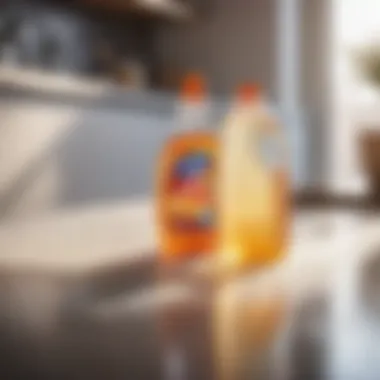Can Dishwasher Detergent Safely Replace Laundry Detergent?


Materials:
- Dishwasher detergent (exact measurements varying depending on load size)
- Laundry machine
- Water
- Laundry
DIY Steps:
- Prepare Laundry: Select the laundry items you wish to wash using dishwasher detergent.
- Measure Detergent: Check the dosage recommendations on the dishwasher detergent packaging based on load size.
- Load Laundry Machine: Place the selected laundry items into your laundry machine.
- Add Detergent: Pour the appropriate amount of dishwasher detergent recommended for the load size into the detergent compartment of the laundry machine.
Technical Aspects:
- Tools: Laundry machine
- Timing specifics: Follow the regular wash cycle time on your machine
- Critical techniques: Ensure proper distribution of the dishwasher detergent in the machine to avoid concentration in one area
DIY Project Process:
- Start Washing: Begin the wash cycle on your machine.
- Monitor Wash: Keep an eye on the machine during the wash cycle to ensure proper detergent distribution.
- Finish & Dry: Once the wash cycle is complete, remove the laundry items and proceed with drying as usual.
Troubleshooting Tips:
- If the laundry appears to have soap residue, consider using less dishwasher detergent in the next wash.
- If the detergent doesn't dissolve properly, try running an extra rinse cycle.
- If there are concerns about compatibility with specific fabrics, test a small inconspicuous area first.
Since dishwasher detergent is designed for dishwashing and may contain harsher chemicals, it's best to use it sparingly and not as a regular laundry detergent replacement. However, in a pinch, it can serve as an alternative for a single load of laundry.
Introduction
In the realm of household cleaning products, the debate over whether dishwasher detergent can be utilized for laundry purposes has sparked curiosity and intrigue among homeowners and individuals seeking unconventional solutions to their laundry needs. This article ventures into the depths of this intriguing topic, dissecting the effectiveness, potential risks, and overall compatibility of using dishwasher detergent for laundry applications. By closely examining the chemical compositions and functionalities of both dishwasher and laundry detergents, readers will be equipped with a comprehensive understanding to determine whether crossing the boundaries between these two cleaning agents is a wise choice or a potential laundry disaster waiting to unfold.
Overview of Dishwasher Detergent and Laundry Detergent
When juxtaposing the compositions of dishwasher detergent and laundry detergent, one can unravel a tapestry of unique ingredients and functionalities that cater to distinct cleaning needs. Dishwasher detergents are specifically formulated to tackle grease, grime, and food residues found on dishes, employing abrasive agents and high-powered enzymes to deliver sparkling clean results. In contrast, laundry detergents focus on removing stains, odors, and dirt from fabrics while being gentle on delicate fibers, utilizing surfactants and enzymes tailored for fabric care.
Purpose of the Article


The primary aim of this article is to shed light on the feasibility and ramifications of utilizing dishwasher detergent in the realm of laundry. By conducting a detailed analysis of the chemical components and cleaning abilities of both detergents, readers will gain valuable insights into the potential consequences and benefits of stepping out of the conventional laundry detergent realm. Additionally, this article aims to provide practical guidance on whether incorporating dishwasher detergent into one's laundry routine is a suitable course of action or a perilous leap into uncharted cleaning territory.
Chemical Composition
In the context of exploring whether dishwasher detergent can be utilized for laundry purposes, understanding the chemical composition of both detergents is paramount. The chemical composition plays a crucial role in determining the efficacy and safety of using dishwasher detergent for laundry. Dishwasher detergents typically contain ingredients such as surfactants, enzymes, bleaching agents, and rinse aids. These elements work in cohesion to break down food particles and grease on dishes efficiently. On the other hand, laundry detergents consist of surfactants, enzymes, builders, fragrances, and brighteners. The unique blend of these components is tailored to effectively clean and enhance the appearance of fabrics.
Ingredients of Dishwasher Detergent
Dishwasher detergents comprise a blend of chemicals uniquely formulated to tackle grease and grime on dishes effectively. Common ingredients found in dishwasher detergents include surfactants, which help in loosening food particles, enzymes like amylase and protease to break down starches and proteins, bleach to remove stains and sanitize, as well as rinse aids for a sparkly finish. These potent ingredients are specifically designed for dishwashing machines, making them powerful but potentially unsuitable for laundry applications.
Ingredients of Laundry Detergent
In contrast, laundry detergents contain a different set of ingredients optimized for washing clothes. Surfactants are key components in laundry detergents, aiding in the removal of dirt and stains. Enzymes like lipase and cellulase target oils and cellulose-based stains, while builders like sodium carbonate enhance cleaning effectiveness. Fragrances are added for a pleasant scent, and brighteners help maintain the vibrancy of colored fabrics. The composition of laundry detergents is meticulously calibrated to cater to the specific requirements of fabric care and cleanliness.
Key Differences
While both dishwasher and laundry detergents share some common components such as surfactants and enzymes, their formulations are distinct to meet the unique demands of their intended uses. Dishwasher detergents prioritize grease-cutting and sanitization for dishware, whereas laundry detergents focus on stain removal, fabric care, and fragrance retention. The key differences lie in the specific enzymes, brighteners, and builders present in laundry detergents that are tailored for fabrics, unlike the heavy-duty components in dishwasher detergents meant for tougher kitchen messes. It is essential to recognize these discrepancies to assess the compatibility and effectiveness of using dishwasher detergent for laundry.
Effectiveness in Laundry
The segment on 'Effectiveness in Laundry' within this article plays a pivotal role in dissecting the practical aspects of using dishwasher detergent for laundry purposes. It is crucial to delve into the actual performance and outcomes when implementing dishwasher detergent in a setting typically designated for laundry routines. Understanding the efficacy of dishwasher detergent in this context holds significant value as it determines the feasibility and convenience of potentially incorporating it into laundry practices. By analyzing the effectiveness in laundry, readers can grasp the real-world implications and benefits of such a crossover in cleaning products.
Cleaning Power Comparison
'Dishwasher Detergent in Laundry' entails a thorough examination of the cleaning power offered by dishwasher detergent when utilized in laundry scenarios. Comparing the cleaning capabilities of dishwasher detergent against traditional laundry detergent unveils essential insights into their respective strengths and weaknesses. Evaluating factors such as stain removal efficiency, odor elimination, and overall cleanliness can aid in illustrating the nuanced differences between the two detergent variations. By juxtaposing the cleaning power of dishwasher detergent with conventional laundry options, individuals can make informed decisions regarding the most suitable choice for their laundering needs.
Stain Removal Capability
Within the realms of laundry operations, the ability of dishwasher detergent to effectively tackle stains becomes a prominent focal point. Assessing the stain removal capability of dishwasher detergent serves as a critical factor in determining its suitability for use in laundering garments. Analyzing how well dishwasher detergent addresses common stains like food spills, grease marks, or grass stains sheds light on its practical utility within the laundry domain. Understanding the nuances of dishwasher detergent in combating stubborn stains is essential for users seeking optimal cleaning solutions that deliver satisfactory results.
Suitability for Different Fabrics


Exploring the suitability of dishwasher detergent for different types of fabrics in the laundry process entails a comprehensive evaluation of how this unconventional detergent choice interacts with varying materials. The selection of the right detergent plays a key role in ensuring the preservation and cleanliness of fabrics, making it essential to scrutinize the compatibility of dishwasher detergent with a range of fabrics.
Addressing the compatibility of dishwasher detergent with different fabrics involves assessing how the chemical components in the detergent may impact the texture, color, and overall condition of various materials. While dishwasher detergents are formulated to tackle tough grease and grime on dishes, their concentrated formula may prove too harsh for delicate fabrics such as silk, cashmere, or wool, risking damage or distortion of fibers upon repeated usage.
Moreover, the detergent's cleansing power and potential impact on fabric colorfastness are crucial factors to consider when exploring its suitability for diverse types of clothing and textiles. Certain fabrics may be more prone to discoloration or fading when exposed to the potent chemicals found in dishwasher detergents, compromising the aesthetic appeal and longevity of garments in the long term.
In essence, understanding the suitability of dishwasher detergent for different fabrics necessitates a nuanced assessment of its compatibility with various materials and textiles. By being mindful of the specific requirements and sensitivities of different fabrics, individuals can make informed decisions regarding the use of dishwasher detergent in their laundry routines, mitigating potential risks and preserving the quality of their clothing and textiles.
Potential Risks and Concerns
When considering the use of dishwasher detergent for laundry, it is crucial to delve into the potential risks and concerns associated with this unconventional practice. Understanding these risks can help individuals make informed decisions regarding their laundering routines.
Residue Build-Up
One significant concern when using dishwasher detergent for laundry is the potential for residue build-up. Unlike laundry detergents, dishwasher detergents are formulated to dissolve quickly in high-temperature water. When used in a washing machine designed for lower water temperatures, these detergents may not fully rinse out, leading to a build-up of residue in both the machine and on the clothes.
This residue can accumulate over time, causing a range of issues such as musty odors in the washing machine, decreased cleaning efficiency, and even potential damage to the machine itself. Additionally, residue left on clothes can cause skin irritation, especially for individuals with sensitive skin.
To mitigate the risk of residue build-up, it is essential to use dishwasher detergent sparingly and ensure thorough rinsing of laundry items. Regular maintenance of the washing machine, including cleaning the detergent dispenser and running empty cycles with hot water and vinegar, can also help prevent residue accumulation.
Skin Sensitivity Issues
Another critical concern associated with using dishwasher detergent for laundry pertains to skin sensitivity. Dishwasher detergents often contain harsh chemicals and additives that may not be suitable for direct contact. These ingredients can lead to skin irritation, redness, itching, and in severe cases, allergic reactions.
Individuals with sensitive skin are particularly vulnerable to these effects and should exercise caution when using dishwasher detergent in their laundry. It is advisable to perform a patch test on a small area of clothing before washing entire loads with dishwasher detergent to assess any adverse reactions.
To minimize the risk of skin sensitivity issues, consider opting for gentler, hypoallergenic laundry detergents specifically formulated for sensitive skin. If irritation or discomfort occurs after using dishwasher detergent for laundry, discontinue its use immediately and consult a dermatologist if necessary.
Color Fading
One of the risks associated with using dishwasher detergent for laundry is the potential for color fading on clothing items. The ingredients in dishwasher detergents, such as enzymes and bleaching agents, may be too harsh for certain fabrics and dyes, leading to accelerated color loss.


Brightly colored or dark garments are particularly susceptible to color fading when washed with dishwasher detergent. This can result in a dull appearance, loss of vibrancy, and overall deterioration of the garment's aesthetic appeal.
To prevent color fading, consider sorting laundry items by color and fabric type before washing with dishwasher detergent. Additionally, using lower temperatures and shorter washing cycles can help reduce the impact of harsh chemicals on fabric dyes.
Correct Usage Guidelines
Diving into the realm of correct usage guidelines when considering the use of dishwasher detergent for laundry is crucial for ensuring optimal results and preventing potential mishaps. Operating outside the recommended guidelines can lead to inefficiencies or even damage to your clothes or washing machine. Understanding the dos and don'ts is key to a successful laundry experience.
In this article, the section on correct usage guidelines sheds light on the importance of adhering to recommended practices. We delve into specific elements such as dosage, compatibility with different fabrics, and potential risks associated with improper usage. By following these guidelines, readers can maximize the benefits of using dishwasher detergent in their laundry routine while safeguarding their clothing and appliances.
Dosage Recommendations
When it comes to using dishwasher detergent for laundry, determining the correct dosage is paramount. Unlike traditional laundry detergent, dishwasher detergents are formulated differently and are more concentrated. It is imperative to follow the manufacturer's instructions on the packaging to avoid overuse or underuse of the detergent.
Based on the type of washing machine, water hardness, and the size and soil level of the laundry load, the dosage may vary. Generally, a little goes a long way with dishwasher detergent, so err on the side of caution when measuring out the amount to use. Experimentation may be needed initially to find the optimal dosage for your specific laundry needs.
Adhering to the recommended dosage not only ensures effective cleaning but also prevents residue buildup in the washing machine, which can compromise its performance over time. By understanding the appropriate dosage recommendations, readers can achieve pristine laundry results without unnecessary waste or damage.
Precautionary Measures
Incorporating precautionary measures into your laundry routine when utilizing dishwasher detergent is essential for maintaining safety and preserving the quality of your clothes. Certain precautions can help mitigate potential risks and enhance the overall effectiveness of using dishwasher detergent for laundry.
One critical precaution is to perform a patch test on a small, inconspicuous area of the fabric before washing the entire load. This test helps assess the compatibility of the detergent with the fabric and prevents irreversible damage or discoloration. Additionally, always store dishwasher detergent in a secure location away from children and pets to prevent accidental ingestion or exposure.
Another precautionary measure is to avoid mixing dishwasher detergent with other cleaning products, especially bleach or ammonia-containing substances. The chemical reactions from such combinations can be hazardous and detrimental to both the laundry and the washing machine. Furthermore, ensure proper ventilation during the washing process to prevent inhaling potentially harmful fumes.
By incorporating these precautionary measures into your laundry routine, you can enhance safety, protect your garments, and optimize the efficiency of using dishwasher detergent for a pristine cleaning experience.
Final Verdict on Using Dishwasher Detergent for Laundry
After a comprehensive examination of the factors at play, the final verdict on using dishwasher detergent for laundry endeavors is nuanced and cautionary. While dishwasher detergent may offer certain similarities in terms of cleaning power, it is essential to recognize the inherent risks and limitations associated with this practice.
One of the primary considerations when contemplating the use of dishwasher detergent for laundry is the impact on washing machines. The unique formulations of dishwasher detergents, tailored for effectively cleaning dishware, may pose challenges when introduced to the gentler mechanisms of washing machines. Issues such as excessive foam production, residue build-up, and potential damage to components reinforce the importance of exercising prudence and diligence in choosing the appropriate detergent for laundry purposes.
Another pivotal aspect to factor in is the compatibility of dishwasher detergent with different fabric types. While some fabrics may withstand the potent cleaning agents found in dishwasher detergents, others, particularly delicate or sensitive materials, may experience adverse effects such as color fading, fabric deterioration, or skin irritation. Hence, individuals must carefully assess the fabric composition of their clothing items before opting to use dishwasher detergent in their laundry routines.
Moreover, the discussion on stain removal capability underscores the nuanced nature of cleaning tasks in the laundry realm. While dishwasher detergent may excel in tackling tough stains on dishes, its efficacy in removing stains from clothing may vary significantly. Factors such as fabric type, stain composition, and detergent formulation all play essential roles in determining the success of stain removal efforts when utilizing dishwasher detergent for laundry purposes.







